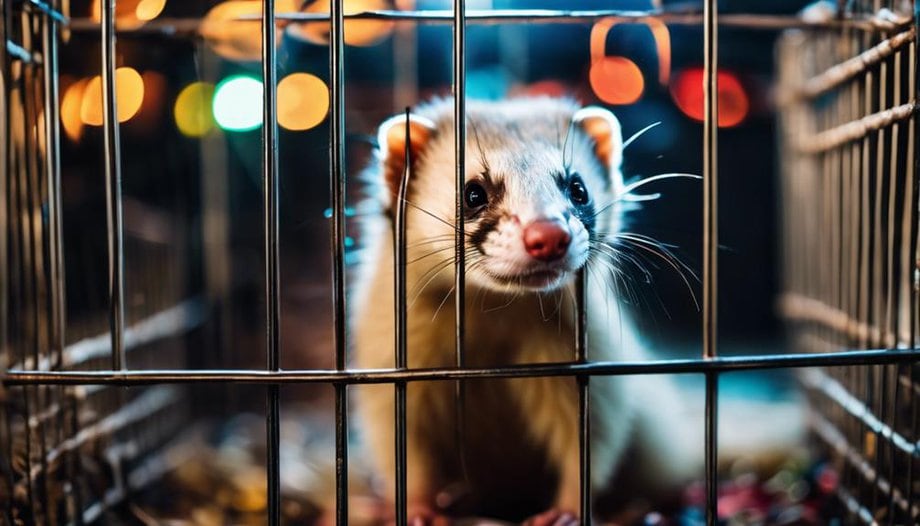Why Ferrets Are Prone to Specific Health Conditions

Ferrets are prone to specific health conditions due to genetic predispositions, respiratory vulnerabilities, and dietary sensitivities.
Their unique makeup makes specialized care essential for their well-being.
Genetic Predispositions
Unraveling Ferret Health: How Genes Influence Well-being
Hey there! Ever wondered why some ferrets are more prone to certain health problems than others? Well, it all comes down to their genes! Let’s dive into how genetics play a crucial role in shaping a ferret’s health.
What’s the Deal with Genetic Predispositions?
- Genetic predispositions are like a ferret’s health blueprint, determining their likelihood of developing certain illnesses.
- Breeding practices and inheritance patterns pass down traits, including potential health risks, from one ferret generation to the next.
The Power of Genetic Testing
- Genetic testing is like a super detective tool that helps identify if a ferret is predisposed to specific diseases.
- Early detection through genetic testing allows for better management and care strategies.
Health Conditions Ferrets Might Face
- Adrenal disease, insulinoma, and lymphoma are common health issues that ferrets might be genetically predisposed to.
- These illnesses can impact a ferret’s well-being and require specialized care from veterinarians.
By understanding the genetic factors at play, ferret owners can make informed decisions about their furry friend’s health needs and take proactive steps to address any potential risks.
Unique Anatomy and Physiology

Unraveling the Mysteries of Ferret Health
Have you ever wondered why ferrets have such unique health needs? Let’s delve into the genetic factors that influence their well-being and shape their special anatomy and physiology.
Short and Sweet Digestive System
- Ferrets have a short digestive system designed for a high-protein and high-fat diet.
- Feeding them the wrong food can lead to tummy troubles, so it’s crucial to understand their specific nutritional requirements.
Metabolism Magic
- Ferrets boast a high metabolic rate, needing frequent meals to keep their energy up.
- They can’t store glucose well, putting them at risk of low blood sugar if they don’t eat regularly.
- Providing a balanced diet tailored to their speedy metabolism is key to their health and happiness.
Understanding these quirks of ferrets’ bodies is essential for keeping them in tip-top shape and ensuring they live long, happy lives.
Dietary Sensitivities and Requirements

Feeding Your Furry Friend: What You Need to Know!
Hey there, ferret lovers! Ever wondered what your little furball needs to stay healthy and happy? Well, let’s dive into the world of ferret nutrition and find out how to keep your pet in top shape!
- Protein Power: Ferrets need a diet packed with animal protein to stay strong and healthy. Look for foods with at least 32-38% protein and 15-20% fat to keep your ferret feeling fantastic!
- Mealtime Madness: Ferrets have fast metabolisms, so they need to munch on their meals every 3-4 hours. Don’t forget to keep that water bowl full for hydration all day long!
- Sugar Shakedown: Watch out for sugary treats that can spell trouble for your ferret’s health. Steer clear of sweets and fruits to keep your ferret feeling their best.
- Carb Caution: Ferrets have sensitive tummies, so go easy on the carbs to avoid any digestive dramas. Keep their diet balanced and gentle on their digestive system.
- Supplement Savvy: Give your ferret a boost with supplements like taurine to keep them feeling tip-top and prevent any nutrient gaps in their diet.
Environmental Factors and Stress

Stress in ferrets can have a significant impact on their health, often leading to various illnesses. Factors such as living conditions, including cage size, enrichment, and social interactions, play a crucial role in determining the stress levels experienced by these animals.
Understanding how environmental factors influence stress can help ferret owners create a more suitable and supportive living environment for their pets.
Stress and Illness Correlation
How Does Stress Affect Your Ferret’s Health?
Ever wondered how stress can impact your ferret’s health? Let’s explore the connection between stress and illness in these sensitive creatures:
- Boosting Immune Response:
Did you know that stress management techniques can actually help your ferret’s immune system? It’s true! By reducing stress, you can boost their ability to fight off illnesses.
- Weakening Immune System:
High-stress environments can weaken your ferret’s immune system, making them more susceptible to diseases. Providing a calm and secure living space is crucial for their well-being.
- Mental Stimulation:
Your ferret needs mental stimulation to stay happy and healthy. Make sure they’ve plenty of toys and activities to keep them engaged and reduce stress levels.
- Playtime and Interaction:
Spending quality time with your ferret isn’t just fun – it’s also beneficial for their stress levels. Regular playtime and interaction with you can have a positive impact on their overall well-being.
- Environmental Triggers:
Keep an eye out for environmental triggers that may cause stress for your ferret. By monitoring their surroundings and making necessary adjustments, you can help maintain a healthy stress balance for your furry friend.
Impact of Living Conditions
How does a ferret’s home affect its happiness and health? Let’s find out!
- Do you know that a small, cramped cage can make a ferret stressed and cause behavior problems?
- Ferrets are super active creatures who need lots of space to move, play, and explore.
- A big cage with different levels and fun activities can make a ferret feel happy and less stressed.
Why is temperature important for ferrets?
- Ferrets can’t handle really hot or cold temperatures well.
- Keeping their home at a comfy temperature is crucial for their health.
- Good ventilation and places for shade or warmth can help keep your ferret stress-free and healthy.
Common Viral Infections

Ferret Health 101: Be a Viral Infection Pro!
Hey there, ferret friends! Ever wondered how viral infections can affect your furry buddies? Let’s dive into some important points to help you keep those sneaky viruses at bay:
- Stay Strong with Vaccines: Giving your ferrets the right vaccines can boost their immune system against common viral infections.
- Stop the Spread: Knowing how viruses can pass from one ferret to another is key to preventing big outbreaks.
- Clean Up, Stay Safe: Keeping things super clean and following quarantine rules can really lower the chances of viral infections in your ferret crew.
- Spot the Signs Early: Regular check-ups and spotting symptoms quickly can help you nip viral infections in the bud.
- Isolate for Safety: If one of your ferrets is sick with a virus, keeping them separate from the others is a must-do to stop it from spreading.
Respiratory System Vulnerabilities

Ferrets are susceptible to respiratory infections that can pose a significant health risk.
Additionally, allergies can also affect the respiratory system of these animals.
Understanding these vulnerabilities is crucial for maintaining the well-being of ferrets.
Respiratory Infections Risk
How can we keep our furry ferret friends healthy and happy when it comes to respiratory infections? Let’s dive into some key tips to protect our ferrets from these pesky problems!
- Have you taken your ferret to the vet lately? Regular check-ups can catch respiratory issues early on.
- Did you know that a clean and well-ventilated environment is crucial for your ferret’s respiratory health? Make sure their living space is fresh and airy.
- What’s on your ferret’s menu? A balanced diet packed with nutrients can help boost their immune system and ward off infections.
- Have you thought about the air your ferret breathes? Keep them away from cigarette smoke and strong chemicals to reduce respiratory risks.
- If your furry friend is showing signs of a respiratory infection, quick action is key! Proper medications can help ease symptoms and prevent complications.
Allergies in Ferrets
Hey there, ferret friends! Have you ever wondered why allergies can affect your furry pals? Let’s dive into how allergies can impact your ferret’s respiratory system and what you can do to help them stay healthy and happy.
What’re allergies in ferrets?
Allergies in ferrets can cause sneezing, coughing, and watery eyes, just like in humans. These reactions can be triggered by things like pollen or dust in their environment.
How can you help manage ferret allergies?
- Keep your ferret’s living space clean and free of dust to minimize allergen exposure.
- Schedule regular check-ups with your vet to monitor any developing allergies.
- Follow your vet’s recommendations for treatment if your ferret shows signs of allergies.
Skin and Coat Issues

Is your ferret’s skin and coat looking a little rough? Let’s dive into how to keep them healthy and shiny!
- Ever wondered why grooming is essential for your ferret? Regular grooming can prevent tangles and hairballs, making their coat soft and smooth.
- Do you know when ferrets shed their fur? Understanding their shedding patterns can help you spot any unusual hair loss that might signal health issues.
- How can you protect your ferret from pesky parasites? Using vet-recommended flea and tick treatments can keep their skin free from infestations.
- What’s the secret to a glowing coat? Try bathing your ferret with a gentle shampoo and moisturizing their skin to keep it healthy and shiny.
- Why is monitoring your ferret’s skin important? Keeping an eye out for irritation, dryness, or strange lumps can help you catch and treat skin problems early.
Frequently Asked Questions
Are Ferrets Prone to Dental Issues?
Ferrets are prone to dental issues due to their diet and lack of proper dental hygiene. Prevention involves providing appropriate chew toys, regular dental checks, and a balanced diet rich in nutrients to support their oral health.
What Are Some Common Behavioral Problems Seen in Ferrets?
Ferrets commonly struggle with litter box training; consistent training and patience are essential. Aggression issues can arise due to fear or territorial behavior. Providing a stimulating environment, socialization, and positive reinforcement can help address these behavioral problems effectively.
How Can I Prevent Obesity in My Ferret?
To help a ferret avoid obesity, it’s essential to provide a balanced diet and engage in regular exercise. Offering proper portion sizes, nutritious foods, and ample playtime can contribute to maintaining a healthy weight for the furry companion.
Do Ferrets Require Regular Grooming?
Ferrets require regular grooming to maintain their coat’s health. Brushing helps prevent mats and keeps their fur clean. Nail trimming is essential too, as it prevents overgrowth and potential injuries. Both grooming tasks contribute to a ferret’s overall well-being.
Are There Any Specific Health Conditions That Ferrets Are Immune To?
Ferrets are not immune to specific health conditions. While vaccinations can help boost immunity, genetic predispositions play a significant role in ferret health. Regular vet check-ups and a balanced diet are crucial for maintaining their well-being.











